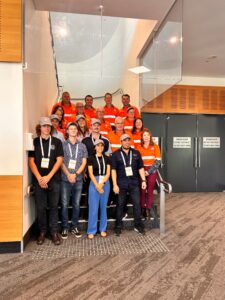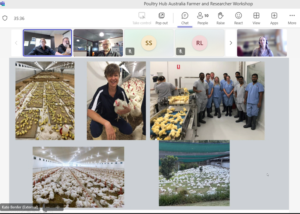This project was led by Associate Professor Ali Ghorashi (aghorashi@csu.edu.au) at Charles Sturt University, who headed a team of collaborators including Associate Professor Sam Pant (Charles Sturt University), Professor Amir Noormohammadi (University of Melbourne), Associate Professor Peter Scott, Dr. Jiongrui Huang (Scolexia Pty Ltd), and two animal science Master’s students Madelaine Poussard and Rebecca Mayne.
Background
Respiratory diseases in chickens often present similar symptoms, making it difficult to identify specific pathogens. Early detection on farms is crucial to prevent rapid spread and mitigate economic and welfare impacts. Current diagnostic methods are costly and time-consuming. Loop-Mediated Isothermal Amplification (LAMP)-based assays offer a promising solution due to their simplicity and accuracy, and they rely on DNA extraction from clinical samples. This study evaluated field-friendly DNA extraction methods for compatibility with LAMP assays, aiming to streamline on-farm disease detection.
Aims/research question
The project aimed to develop and test a faster and more accurate way to detect common avian bacterial respiratory diseases like Pasteurella multocida, Mycoplasma gallisepticum, and Erysipelothrix rhusiopathiae. It focused on developing LAMP-based tests for this purpose. Additionally, it assessed various rapid DNA extraction methods to make these tests easier to use directly on farms, aiming to improve on-site diagnosis.
What industry issue/problem did you set out to solve?
Rapid diagnosis of bacterial diseases in chicken flocks is important due to the rapid spread these diseases can incur. Bacterial diseases, such as those affecting the respiratory system, have the potential to spread rapidly among birds within a flock. Identifying these pathogens quickly is essential to prevent further transmission and mitigate their impact on bird health and welfare.
Timely diagnosis allows for prompt veterinary intervention and implementation of preventive measures. By detecting the specific bacterial pathogens causing disease, veterinarians can tailor treatment strategies effectively. This not only minimises the suffering of affected birds but also helps prevent widespread outbreaks that could devastate the entire flock.
Furthermore, rapid diagnosis plays a crucial role in biosecurity measures. Knowing the exact pathogens present enables farmers to implement targeted biosecurity protocols to contain the spread of disease within the flock and prevent it from spreading to neighbouring sheds or farms. This not only protects the health of the chickens but also safeguards the economic viability of the poultry operation.
Outcomes/impact
The main outcomes of this research involved the development of three colourimetric LAMP assays for Pasteurella multocida, Mycoplasma gallisepticum, and Erysipelothrix rhusiopathiae. These assays were designed to be simple, cost-effective, and easily interpretable, making them suitable for on-farm use. We also successfully identified a DNA extraction method that is compatible with the LAMP assays, ensuring efficient and reliable detection of these pathogens without the need for complex laboratory equipment or specialized expertise. This research has provided a practical and accessible tool for the rapid diagnosis of these bacterial diseases. The take-home message is that early detection through user-friendly diagnostic tools is key to effective disease management and biosecurity in poultry farming, ultimately benefiting both animal welfare and industry sustainability.

Future research/next steps
- Further validation of these tests necessitates field experiments to assess their efficacy directly on poultry farms.
- Implement training programs for industry professionals to use LAMP assays, despite their user-friendliness, to ensure effective on-site pathogen detection and enhance biosecurity measures, with the research team available to support such initiatives
- Invest in LAMP-based diagnostics for routine surveillance in poultry farms, as our project demonstrates their efficiency in promptly identifying avian respiratory pathogens, offering early disease detection, with CSU’s research team ready to collaborate with PHA for development and adoption of these assays.
- Explore lyophilisation of LAMP reagents to eliminate cold chain requirements, enhancing the practicality of these assays, especially in scenarios where maintaining a constant cold chain is challenging, offering significant logistical and financial benefits.
Associate Professor Ali Ghorashi




